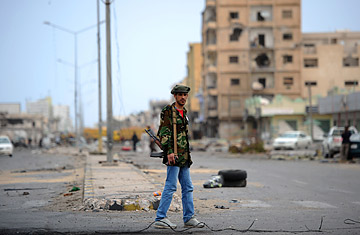
A Libyan rebel stands guard in the severely damaged Tripoli street of the besieged city of Misratah on April 26, 2011.
(2 of 2)
There are those in the city who see Misratah imposing order on Libya and Tripoli and not the other way around. Misratah's influence already extends to parts of Tripoli, where rebel brigades from Misratah, the Nafusa Mountains, and other coastal towns that helped drive the final push to liberate the capital in late August have chosen to stay, purportedly to maintain security, despite the protests of some Tripoli residents. "We have Dreibi, we have the interior ministry on the road to the airport, Ismail Kurami's house," says Shami, the commander of Mistrata's City Center Brigade, listing Misratah's areas of control in Tripoli. "The eastern beach, and part of Matega base," one of his fighters, Nasser Abeid, adds. Tripoli's military commander Abdelhakim Belhaj called recently for unauthorized outside militias to leave the capital. But the outsiders, including Misratah's fighters say Belhaj has no control over them.
And then there are Misratah's politicians. Everyone in town knows that Abdel Rahman Swehli, a prominent local leader and the grandson of the city's Italian war era hero, is interested in contesting the future Libyan presidency. "Swehli wants it," says Nasser Abeid, a fighter with the City Center Brigade. "I don't know Abdel Rahman Swehli, personally," he adds. "But there is a lot of history. The grandfather," he says referring to Ramadan Swehli, who helped lead Misratah's resistance against the Italian occupation in the early 20th century. " The Italians bombed Misratah for nine years and it held strong while other Libyan cities fell. "Abdel Rahman Swehli is a straightforward man. And he has resisted Gaddafi for a long time," he adds.
Recently, reports leaked out that the NTC was planning to give the position of interim defense minister to Salem Joha, a powerful Misratah commander, as part of a cabinet reshuffle meant to appease unhappy political powerbrokers. But the NTC's final announcement that the current defense minister Jalal Dghaili, would keep his job may hint instead at further infighting at the top, where conflicts have already emerged between Tripoli commanders and Mahmoud Jebril, the de facto Prime Minister.
On Oct. 3, Jebril and NTC chairman Abdel Mustafa Jalil announced that once Gaddafi's hometown of Sirt falls under NTC control, they would cede power to a new transitional government and begin plans to hold democratic elections in eight months.
But the campaign to capture Sirt is barely in the NTC's hands. "It's not the local NTC that's controlling the area," says Adel Ibrahim, an official at the Misratah media center, of the city's broader surroundings. "It's the Misratah military council that's controlling the area from Tripoli to Sirt right now." Referring to the fighters on the Sirt front, says Col. Ramadan Zarmouh, commander of Misratah's forces, "They're all from Misratah.This operation is volunteers, not army. We don't have orders to go to Sirt, but we go. There is no central order. Each city has a military council and a local council."
The prospective "liberation" of Sirt has raised concerns about what comes afterward for a city that has put up ferocious resistance. Sirt's neighbor, the former loyalist stronghold of Tawergha, was rendered nearly uninhabitable because of the clearing and looting that followed its capture by Misratah's forces. Tawergha's fate has elevated tensions between Misratah and some officials in the NTC. But Misratah forces, who blame Tawergha for what they say was a major role in Misratah's siege and violence, including alleged mass killings and rapes, say they have no intention of ever relinquishing the town to its former residents. "Tawergha is over. Misratah finished it. They can never go back. They can live abroad, in the desert," says Shami's aide, Fudaysi. Even if the National Transitional Council mandates it, they say, Misratah won't give in.
"No!" Shami shouts at the thought. "No, no. You know 106 millimeter shells? Howitzers?" He takes aim with his arm and mimics the act of spraying someone or something with bullets. "We'll destroy the council. There will be no council," he says, issuing a threat against the NTC. Peter Bouckaert, the Emergencies Director of Human Rights Watch, says the NTC's inability or unwillingness to deal with the issue also raises serious concerns. "Jibril's comments a few weeks ago that the Tawergha problem is really for the Misratahns to resolve and not the NTC points 180 degrees in the wrong direction," he told TIME in an e-mail.
In the Sirt suburb of Abu Hadi, rebels who had moved in from Benghazi in Libya's east, have argued with Misratah fighters over the latter's role in looting the recently captured territory, the Associated Press reported on Wednesday. But many of the Misratah fighters believe that they are the only ones with the right to determine the fate of the area they control. "We will not lay down our weapons until the war is over," says Yahya Ibrahim, a 16-year-old fighter who now guards an entrance to Tawergha to keep its residents from returning. "When the war is over, we will surrender our weapons to someone we trust — but not just anyone — because maybe they'll try to fight us."
